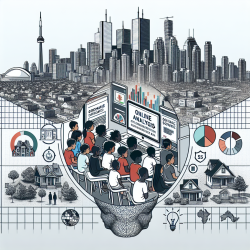Introduction
As practitioners in the field of speech-language pathology, we are always on the lookout for innovative strategies to enhance the efficacy of our services. The research article "Sustainable mobility in auto-dominated Metro Boston: Challenges and opportunities post-COVID-19" offers valuable insights that can be adapted to improve our online therapy services. By understanding the challenges and opportunities presented in this research, we can better tailor our approaches to meet the needs of our clients, particularly children, in a post-COVID world.
Understanding the Context
The research highlights the significant impact of COVID-19 on societal patterns, particularly in transportation. It underscores the psychological dread associated with mass transit and the resulting shift towards private car ownership. This shift has implications for accessibility and affordability, particularly for low-income households. As online therapy providers, we can draw parallels between these mobility challenges and the barriers faced by children in accessing quality therapy services.
Adapting Research Insights to Online Therapy
Here are several ways practitioners can apply the findings from this research to enhance online therapy outcomes:
- Accessibility and Affordability: Just as the research advocates for a multi-modal approach to transportation, we should strive to offer diverse and flexible therapy options. This could include a mix of synchronous and asynchronous sessions, allowing families to choose what best fits their schedule and resources.
- Building Trust and Confidence: The research emphasizes rebuilding trust in mass transit. Similarly, we must focus on building trust with families by ensuring the security and privacy of online sessions and demonstrating the effectiveness of our methods through data-driven results.
- Technological Integration: The importance of technological integration in mobility services is mirrored in online therapy. We should leverage advanced platforms that offer seamless experiences, such as integrated assessment tools and real-time progress tracking.
Encouraging Further Research
The research on sustainable mobility encourages us to think critically about our practices and seek continuous improvement. Practitioners are encouraged to engage in further research to explore:
- The impact of various online therapy modalities on different speech and language disorders.
- Long-term outcomes of online therapy compared to traditional in-person sessions.
- Innovative ways to enhance engagement and motivation in virtual settings.
Conclusion
By drawing inspiration from the challenges and opportunities identified in the sustainable mobility research, we can enhance our online therapy services to create better outcomes for children. Embracing a data-driven approach and remaining open to new research will ensure that we continue to provide high-quality, accessible, and effective therapy.
To read the original research paper, please follow this link: Sustainable mobility in auto-dominated Metro Boston: Challenges and opportunities post-COVID-19.










